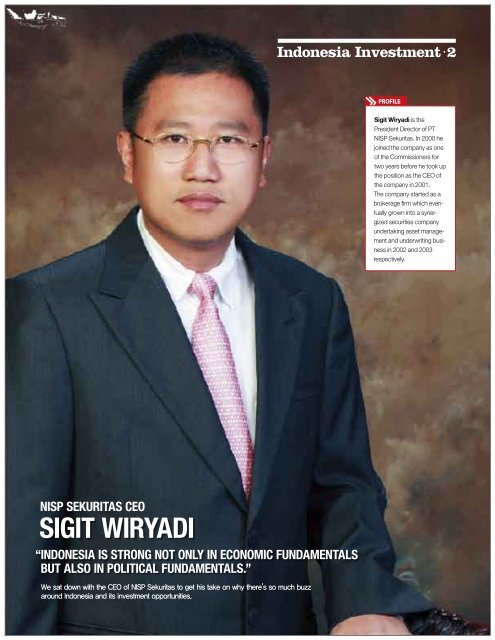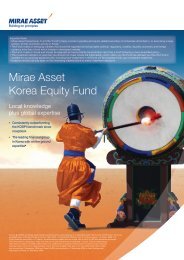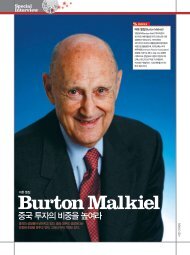You also want an ePaper? Increase the reach of your titles
YUMPU automatically turns print PDFs into web optimized ePapers that Google loves.
Indonesia Investment·2ProfileSigit Wiryadi is thePresident Director of PTNISP Sekuritas. In 2000 hejoined the company as oneof the Commissioners fortwo years before he took upthe position as the CEO ofthe company in 2001.The company started as abrokerage firm which eventuallygrown into a synergizedsecurities companyundertaking asset managementand underwriting businessin 2002 and 2003respectively.NISP Sekuritas CEOSigit Wiryadi“Indonesia is strong not only in economic fundamentalsbut also in political fundamentals.”We sat down with the CEO of NISP Sekuritas to get his take on why there’s so much buzzaround Indonesia and its investment opportunities.Emerging Markets Insight 12
Indonesia Investment·2Indonesia is re-emerging as mainstreaminvestment option based on its robustgrowth amid a gloomy global economiclandscape. What do you think are the fundamentalgrowth engines Indonesia possesses?The Indonesian economy has been experiencingmoderate and healthy growth over thepast 5 years at a rate of 4.5 percent — 6.5percent.Here, the two main drivers for growth weredomestic consumption and foreign directinvestment (FDI), which accounted for morethan 70 percent of the country’s GDP.Furthermore, relatively low domestic inflationduring the period encouraged Indonesia’scentral bank to lower its benchmark interestrate gradually from over 9 percent to 5.75percent, which further boosted the domesticreal economy.Domestic consumption has been the mainbeneficiary amidst the low interest rate environment.Indonesia’s FDI has been robustly growingyear-on-year to where it reached $5.61 billionfrom January-March 2012. Most of the investmentsthis year were in mining, transportation,warehousing, telecommunications, electricity,gas, and water projects.The flourishing of the Indonesian economyhas also been acknowledged by internationalrating agencies including Fitch and Moody’s ;they recently upgraded Indonesia to aninvestment grade whilst S&P is expected tofollow suit in the near future. As a consequence,the Domestic InvestmentCoordinating Agency (BKPM) is optimistic thatthe rating upgrade will attract more investorsto Indonesia.As Indonesia’s growth potential is beinghighlighted, more and more foreign investorsare flocking to Indonesia. Specifically,where are foreign investors putting theirmoney (e.g . equities, bonds, commodities,FX, etc.)? What reasons do you think laybehind investors’ preference towardthese kinds of investments?Domestic consumptionhas been the mainbeneficiary amidst the lowinterest rate environment.Foreign ownership in Indonesian governmentbonds amounted to approximately$24,281 billion by the end of 2011. This figureis nearly quadruple that of the 2006’s balanceof $5.988 billionDuring the year, foreign investors were alsoinvesting in equities. Based on Bloomberg andIDX data, Foreign investors have been netbuyers every year, ranging from $1.524 billion-$3.593billion per annum, over the pastfive years. Foreign investors have accumulativelybeen net buyers of $12.195 billion from2007-2011.It is believed that the political stability, stablemacro-economic environment, low interestrate, strong fiscal policy, and the stableRupiah currency are the main factors impactinginvestors’ risk appetite to invest inIndonesia.In the near future, where do you believethe meaningful investment opportunitieswill be Indonesia?Compared to other developed Asian countries,the ratio of the Indonesian Asset underManagement of domestic mutual funds to theGDP is still relatively low (it’s below 3 percent).Therefore, we believe there is abundantopportunity in the fund managementindustry.As for the Indonesian asset managementindustry, what types of investmentproducts are investors are focusing on?Looking at the Asset under Management(AUM) figures below, we can see the trend ininvestment products over the past 7 years.The major trend has consistently includedinvestments in Equity funds and Protectedfunds. Their total AUMs are $6.641 billion and$4.551 billion or 36.47 percent and 24.87percent of the total funds respectively in2011. The funds have grown 13 times since2005.Indonesia sold 30-year dollar-denominatedbonds during January as its creditrating was restored to investment gradeby international credit rating companies.Some believe successful bond issuancein Indonesia will be followed by a relentlessstream of debt issuance from emergingmarkets. How do you expect the Indonesianbond market will develop? What isyour perspective on Indonesia’s bondmarket?The Indonesian local currency governmentbonds have developed rapidly over thepast 10 years with the total outstandingbonds in 2011 being IDR 723 trillion — nearlydouble what they were in 2002 (IDR 394trillion). This jump can be attributed to theregular bond issuance by the governmentevery year to finance the budget deficit. Onthe other hand, the country’s credit metric,or the government debt to the GDP ratio,continued to trend lower, at around 25 percentin 2011.Moreover, corporate bond issuances havecontinued to rise following the low interestrate condition, robust domestic economy,and refinancing needs. It is expected thatabout $5,988 billion-$6,533 billion worth ofcorporate bonds will be issued this year, upEmerging Markets Insight 13
Indonesia Investment·2AUM per type of Mutual Fund in Indonesia:Period(yr)MoneyMarketFundProtectedFundFixedIncomeFundBalancedFundEquityFundIndexFundETE -EquityETE -FixedIncomeShariahFundTotalAUM2005 2,080 3,086 13,855 5,456 4,928 - - - - 29,4052006 3,801 11,547 19,521 8,471 8,251 30 - - - 51,6212007 4,829 16,345 21,286 14,233 34,800 117 78 504 - 92,1922008 2,302 29,331 10,931 10,002 19,891 101 44 689 774 74,0652009 5,080 34,624 20,087 15,658 36,891 290 45 629 3,671 116,7322010 7,722 42,008 27,273 21,989 45,508 261 26 387 3,764 149,0992011 9,834 41,834 28,930 21,713 61,353 240 35 531 3,767 168,237Proportion(2011)5.84% 24.87% 17.20% 12.91% 36.47% 0.14% 0.02% 0.32% 2.24%Source: Bapepam & LKfavored. Indonesia is one of the largest coalexporters that are set to benefit from risingglobal coal demand as coal remains one of thecheapest forms of alternative energy.Meanwhile, as the largest CPO producer andexporter, Indonesia is also enjoying the growingCPO demand amid rising global populationand the increasing popularity of CPO-basedcooking oil, oleo chemical, and bio-diesel.Nevertheless, given the volatility of commodityprices, the preferable sectors at thismoment are the ones that focus on domesticstrength: Consumer-related and infrastructuresectors.from around $5.008 billion last year.Insurance, mutual funds, and pensionfunds have been spotted to switch their portfoliosfrom government bonds to corporatebonds to enhance their returns given thedeclining government bonds’ yield.Meanwhile, the demand for corporate bondsfrom foreign investors has also increased to$740.417 million.The country’s rating upgrade that was followedby the declining bond yields, paves theway for foreign investors to invest in local currencybonds. Thus, the local currency bondmarket is expected to be more liquid. Theflush liquidity in the market also supports thecorporate bond issuances as demand forrecent issuances were very strong and usuallyoversubscribed considerably. Hence, governmentand corporate bond markets shouldfurther develop in the future while improvingmarket liquidity.What about equities? Despite growthpotential, Indonesian stocks are beingtraded at a record high price.The Indonesian stock market is being tradedat high prices because of the country’sgrowth potential. Indonesia is one of the leastaffected by the global crisis as proven by itsstrong economic growth of above 6 percentover the past 2 years.Indonesia is expected to stand out amongthe crowd despite the continuation of theEuropean crisis; the crisis is not expected togreatly affect economic growth due toIndonesia’s high level of domestic consumption,supported by its growing middle classwith rising disposable income (as GDP percapita surpassed $3,500 in 2011). In fact, theIndonesian government expects the countryto continue to grow by 6.5 percent this year.Despite certain risks such as low valuationmerit of Indonesian equities, can youoffer some advice on investing in theIndonesian stock market? What sectorscan you suggest as the most promisingsectors in Indonesia in a foreseeablefuture?There are several promising sectors inIndonesia given its strong economic growth.The consumer related and property sectorsare attractive given the rising purchasingpower and relatively low interest environment.In addition, its infrastructure sector benefitsfrom the property boom as well as therecently passed land-clearing law that simplifiesthe land acquisition process required forthe development of the infrastructureIn the commodity related sectors, coalmining and plantation sectors are alsoThe Indonesian capital market hasrecently seen rapid growth of Islamicbonds and investment funds. What are themain drivers behind this trend?Indonesia has the biggest Muslim populationin the world. It offers bright prospects forthe development of the Islamic CapitalMarket. The Sharia is currently enjoyinggrowth, marked by the government andincreasing number of corporations issuingSharia instruments to raise financing, as wellas the growing public understanding of Shariainstruments.Protected Fund:“A type of mutual fund that guarantees aninvestor at least the initial investment, plus anypotential gains, if it is held for the contractualterm. The initial investment can only be paidback after the guarantee period is over, if theinvestor sells before this period, he/she issubject to the current value of the fund and anylosses that may arise. This fund is often heavilyinvested in fixed-income securities.”In 2011, the total number of funds (646 funds)and the total unit holders (476,940) were nearlydouble what they were in 2005. Whilst the totalAUM and outstanding units, $18.292 billion and99 billion units respectively, were approximately5 times compared to 2005.Emerging Markets Insight 14
Indonesia Investment·2Jakarta is the most populous city in Indonesia and in Southeast Asia, and is the twelfth-largest city in the world.Reinforcing this growth are the government’sinitiatives in issuing regulationsaddressing the current constraints on thedevelopment of Indonesian Islamic CapitalMarkets. These factors offer positive supportfor future development of the markets.The widening rich-poor gap, trade protectionism,inflationary pressure, and poorcondition of state infrastructure can bementioned as major setbacks draggingdown the country’s economy.From an investor’s point of view, whatare the risk factors that should be closelymonitored and is there any governmentmeasure ready to tackle these issues?The widening income gap is a risk factor forpolitical instability in Indonesia as a youngdemocracy.Political stability is a major investor prerequisitefor long term investment in any emergingmarket, thus as an effort, the Indonesiangovernment has provided freedom of speechand decentralized government as a way toreduce imbalances in its society, solidifyingthe fully democratic country as a globalinvestment destination.As the Moody’s and Fitch country investmentgrade attainment attests, Indonesia isstrong not only in economic fundamentals butalso in political fundamentals; both of whichwill ensure long term social stability.Recently, Mirae Asset in Korea has announcedthat it has agreed to acquire a 70 percentstake in NISP Asset Management.This move underscores how attractiveIndo-nesian markets are to foreign investorsand how eagerly they want to enterinto the market. What kind of differentiationstrategy will you design and implementin the asset management companyafter the acquisition?Given Indonesia’s promising opportunityin the investment management industry andcompany niche offered by both Mirae andNISP Asset Management, our strategy willfocus on developing innovative products,based on our strength in possessing localknowledge and Mirae Asset expertise ininvesting with a long term perspective.This combination will enable our futurefunds to become flagship products for thelocal market whilst keeping within the MiraeAsset product range. We believe the flagshipproducts will add value to Mirae Asset’s globalportfolio.Emerging Markets Insight 15






